Summary of the Project on teaching and learning foreign languages in the national education system for the period 2017-2025
On the morning of September 12, the Ministry of Education and Training held a conference to review the Project on teaching and learning foreign languages in the national education system for the period 2017-2025. Permanent Deputy Minister Pham Ngoc Thuong chaired the conference.
Deploying the Project on teaching and learning foreign languages in the national education system for the period 2017-2025, Permanent Deputy Minister Pham Ngoc Thuong emphasized 10 outstanding results regarding: objectives; facilities; programs and materials; qualifications of teachers; opportunities to access foreign languages; international cooperation; method innovation; teacher training; foreign language environment and foreign language learning movement.
Specifically, all targets have been achieved and exceeded compared to the Project; the foreign language teaching and learning system has been enhanced and gradually modernized; the programs and materials are rich, diverse, and approach international standards. The level of the teaching staff has been significantly improved. Students have access to foreign languages more and more widely. International cooperation is diverse and effective, contributing to improving quality. Teaching, testing, and assessment are continuously improved. Teachers specializing in foreign languages, especially English, are focused on training and improving quality. The foreign language environment is expanded, diverse, and rich with many solutions. The need and trend of learning foreign languages are formed widely and stronger than in the previous period...
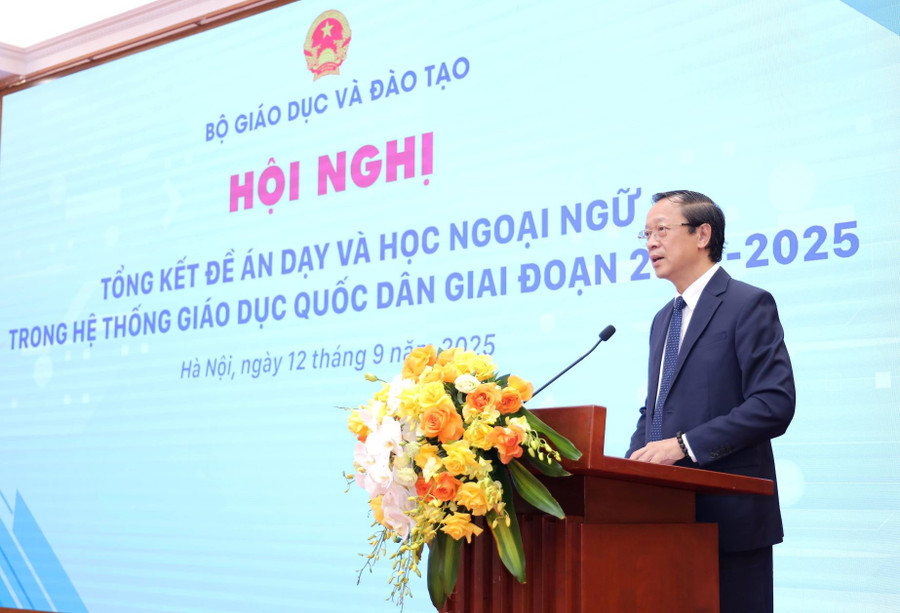
In addition to the results achieved, the Deputy Minister also pointed out some limitations. Accordingly, the foreign language proficiency of teachers and students, especially English according to output standards, has not yet reached the desired level. The new teaching mainly focuses on "learning foreign languages" without really paying attention to "learning languages". The impact of the Project on preschool and general education is not really proportional to university education and vocational education. The policy for foreign language teachers in general, English teachers and teachers teaching other science subjects in English has not been given due attention and is not really suitable. Socialization in the field of foreign language teaching and learning needs to be further promoted.
In the coming time, the Deputy Minister suggested that it is necessary to maximize the results of the Project. Educational institutions, Departments of Education and Training, and ministries and branches - based on their functions and tasks - advise unit leaders to summarize and evaluate the implementation of the program in a serious, scientific, concise but effective manner, thereby creating a practical movement. Thereby, looking back at the direction and organization in the past, drawing experience and determining appropriate directions for the new period.
The Project Management Board continues to preside over the development of the National Foreign Language Teaching and Learning Project for the period 2026-2030, with a vision to 2045. This will be a new project, in addition to its own orientation on making English a second language, and must be designed with a breakthrough spirit, closely following the spirit of Resolution 71. Research and develop a working regime for lecturers and teachers teaching other subjects in foreign languages...

Summary of legal work
On September 10, the Ministry of Education and Training held a conference to review legal work for the 2024-2025 school year. Deputy Minister Nguyen Van Phuc chaired and delivered a speech at the conference.
Speaking at the conference, Deputy Minister Nguyen Van Phuc emphasized: Legal work is of special concern to the Minister and is also a mandatory requirement of the Government for heads of ministries, branches and affiliated units.
The importance of this work is increasingly affirmed, especially when the 2024-2025 school year takes place in the context of many major changes in the socio-economic and state apparatus organization, from the arrangement and merger of localities to the implementation of the two-level government model. The education sector has quickly adapted, contributing to the good implementation of the country's common tasks.
Regarding specific results, the Deputy Minister said: On June 12, 2025, the Ministry of Education and Training advised the Government to issue Decree No. 142/2025/ND-CP and 143/2025/ND-CP; on the same day, the Minister also issued 5 Circulars on decentralization, delegation, and assignment of authority in education management. These documents take effect from July 1, 2025.
At the 9th session, the 15th National Assembly passed many important documents advised by the Ministry of Education and Training, including the Law on Teachers; Resolution No. 217/2025/NQ-QH15 on exemption and support of tuition fees for preschool children, general education students and learners of general education programs; Resolution No. 218/2025/NQ-QH15 on universalizing preschool education for children from 3 to 5 years old.

Besides the achieved results, there are still limitations: the progress of issuing and reviewing documents is still slow; the quality of internal documents at some higher education institutions is uneven and not updated promptly; the coordination between units is not really smooth...
At the conference, delegates focused on discussing, sharing experiences, objectively assessing achievements and limitations, analyzing causes, and proposing solutions to improve the legal framework and policy mechanisms to ensure consistency, detect new issues and remove obstacles. On that basis, together they determined key tasks for the 2025-2026 school year, aiming to improve management effectiveness and efficiency.
On this occasion, Deputy Minister Nguyen Van Phuc awarded Certificates of Merit from the Minister of Education and Training to 4 groups and 12 individuals for their outstanding achievements in reviewing and organizing the handling of problems in the legal system.

Summary of education and training content in the National Target Program on new rural construction
On September 12, in Da Nang City, the Ministry of Education and Training held a conference to review the contents of education and training in the National Target Program on New Rural Development for the 2021-2025 period, with orientations for the 2026-2030 period; combined with a workshop to assess the implementation of education and training indicators in the National Criteria for New Rural Development at all levels for the 2021-2025 period and proposals for the 2026-2030 period. Deputy Minister Le Tan Dung chaired the conference.
According to the summary report of 5 years of implementing the National Target Program on New Rural Construction in the Education sector for the period 2021-2025, one of the clear highlights is the change in educational infrastructure.
If in 2020, the rate of schools meeting national standards was only 10.9%, by 2024, this number had increased to 62.8%. Of which, 59.5% of preschool schools met national standards, 43.4% of primary schools met level 1 standards and 18.2% met level 2 standards, and 52.4% and 13.9% of secondary schools met levels 1 and 2, respectively.
Nationwide, 87.5% of communes meet the school criteria, with the Red River Delta reaching 100% and the Southeast reaching 98%. However, in the Northern mountainous region and the Central Highlands, due to limitations in economic conditions and terrain, this rate is still lower than the general level.
Along with upgrading facilities, the quality of education has also made significant progress. Universalization work has been maintained and improved nationwide. To date, 100% of provinces and cities have met the standards for universal primary and secondary education, of which 64% of localities have met the standards for primary education level 3.
In the 2024-2025 school year alone, the rate of primary school enrollment at the right age will reach 99.7% and the rate of primary school graduates continuing to secondary school will reach 98.23%. In disadvantaged areas, all northern mountainous provinces and the Central Highlands have maintained the standard of universal preschool education for 5-year-old children; the rate of children enrolled in class will reach 98% or higher, many places reaching 100%. The quality of care and nutrition will also improve, with the rate of children attending two sessions a day reaching 97.7% and children attending boarding school reaching 95.1%.
Literacy eradication work continues to bring about remarkable changes. The literacy rate in the 15-60 age group has increased from 97.85% in 2021 to 99.1% in 2025. To date, 84% of communes have met the level 2 literacy standards…

Speaking at the Conference, Deputy Minister of Education and Training Le Tan Dung emphasized that the National Target Program on New Rural Construction for the 2021-2025 period is a key program of the Government, in which education plays a key role in improving the quality of human resources and completing the criteria on schools, universalization and illiteracy eradication.
After 5 years of implementation, the education sector has achieved many positive results: school facilities have been upgraded, literacy rates have been maintained, and vocational training has been more closely linked to production and labor market needs. However, challenges regarding sustainability and regional disparities still exist.
The Deputy Minister requested units to continue promoting the achieved results, focusing on solutions in the coming time: perfecting mechanisms and policies on universalization, compulsory education, vocational training, and illiteracy eradication; increasing investment in facilities, human resources, and teacher regimes, especially in disadvantaged areas; promoting digital transformation, building a data system; mobilizing socialized resources, public-private and international cooperation; developing a culture of lifelong learning, building a model of schools associated with new rural areas; strengthening monitoring, evaluation, and replicating advanced models.
The Education sector will continue to closely coordinate with ministries, departments, branches, localities and the whole society to deploy effective solutions to complete the set goals in the 2026-2030 period, contributing to "building a modern, comprehensive, sustainable new countryside, adapting to climate change", with the vision of "ecological agriculture, modern countryside, civilized farmers".
At the Conference, the Ministry of Education and Training also organized a summary of the implementation of the emulation movement "The whole country joins hands to build new rural areas" and organized awards for collectives and individuals with outstanding achievements, typical examples, and breakthroughs in the field of rural education.
Temporarily suspend planning, consider appointing new school board leaders and school leaders
On September 12, the Ministry of Education and Training sent two official dispatches to universities and vocational education institutions regarding the temporary suspension of planning work and consideration of new appointments of school board leaders and school leaders.
The document stated: On August 22, 2025, the Politburo issued Resolution No. 71-NQ/TW on breakthroughs in education and training development; which includes the content "No school councils will be organized in public educational institutions (except for public schools with international agreements).
In order to ensure the stable operation of schools, the Ministry of Education and Training requests that affiliated higher education and vocational education institutions, ministries, ministerial-level agencies and People's Committees at all levels, within their scope, guide higher education and vocational education institutions - from September 12, 2025 as follows:
The School Council, the Chairman of the School Council, and the Vice Chairman of the School Council (if any) whose term expires shall continue to operate until new instructions are issued. In the event that the Chairman of the School Council has passed the age of management, the Vice Chairman (if any) shall operate the School Council, or the School Council shall elect an operator if there is no Vice Chairman of the School Council.
Temporarily suspend planning work with the Chairman of the School Board and Vice Chairman of the School Board (if any).
Temporarily suspend planning and consideration of new appointments for the positions of Director, Deputy Director, Principal, and Vice Principal until new instructions are available (not applicable to reappointment at the end of the term).

On September 12, in Khanh Hoa, Minister of Education and Training Nguyen Kim Son worked with Nha Trang University and presented the decision to recognize Dr. Quach Hoai Nam as the Rector of Nha Trang University. On the same day, the Minister visited and worked with Nha Trang Central Pedagogical College.
Source: https://giaoducthoidai.vn/nong-trong-tuan-tong-ket-de-an-ngoai-ngu-quoc-gia-cong-tac-phap-che-post748405.html


![[Photo] The 1st Congress of Phu Tho Provincial Party Committee, term 2025-2030](https://vphoto.vietnam.vn/thumb/1200x675/vietnam/resource/IMAGE/2025/9/30/1507da06216649bba8a1ce6251816820)

![[Photo] General Secretary To Lam, Secretary of the Central Military Commission attends the 12th Party Congress of the Army](https://vphoto.vietnam.vn/thumb/1200x675/vietnam/resource/IMAGE/2025/9/30/9b63aaa37ddb472ead84e3870a8ae825)
![[Photo] Solemn opening of the 12th Military Party Congress for the 2025-2030 term](https://vphoto.vietnam.vn/thumb/1200x675/vietnam/resource/IMAGE/2025/9/30/2cd383b3130d41a1a4b5ace0d5eb989d)
![[Photo] General Secretary To Lam receives US Ambassador to Vietnam Marc Knapper](https://vphoto.vietnam.vn/thumb/1200x675/vietnam/resource/IMAGE/2025/9/29/c8fd0761aa184da7814aee57d87c49b3)

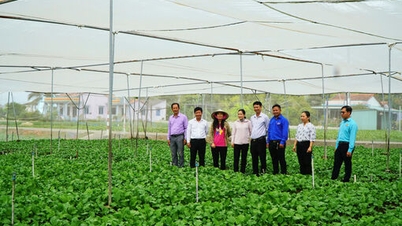



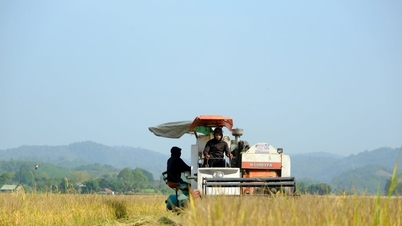









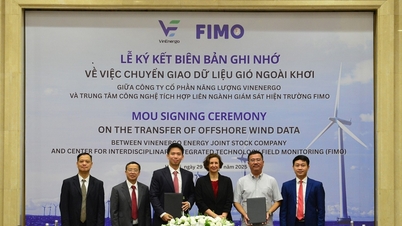



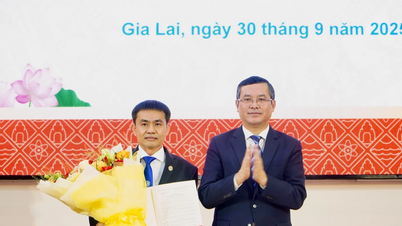







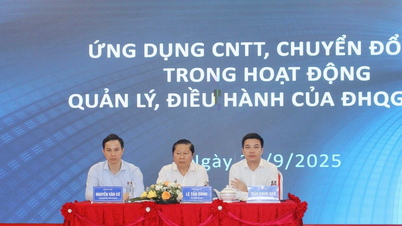
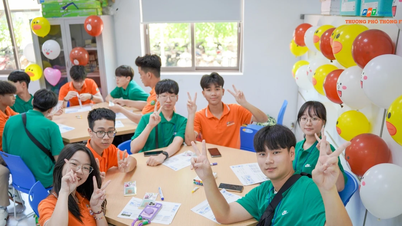



![[Photo] General Secretary To Lam attends the ceremony to celebrate the 80th anniversary of the post and telecommunications sector and the 66th anniversary of the science and technology sector.](https://vphoto.vietnam.vn/thumb/1200x675/vietnam/resource/IMAGE/2025/9/29/8e86b39b8fe44121a2b14a031f4cef46)





































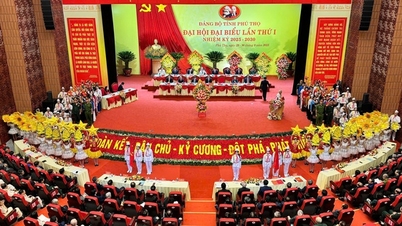

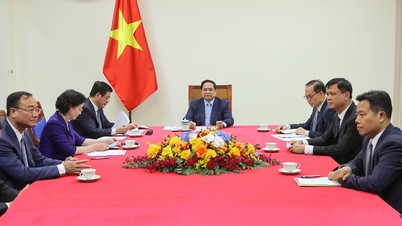

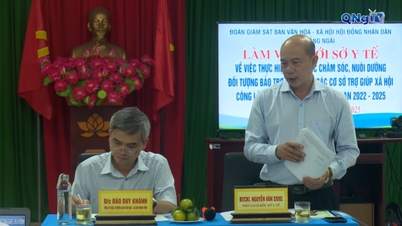



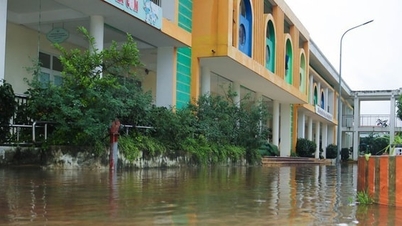

















Comment (0)